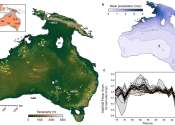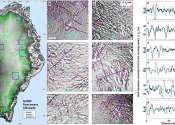Researchers reconstruct landscapes that greeted the first humans in Australia around 65,000 years ago
Seventy thousand years ago, the sea level was much lower than today. Australia, along with New Guinea and Tasmania, formed a connected landmass known as Sahul. Around this time—approximately 65,000 years ago—the first ...









